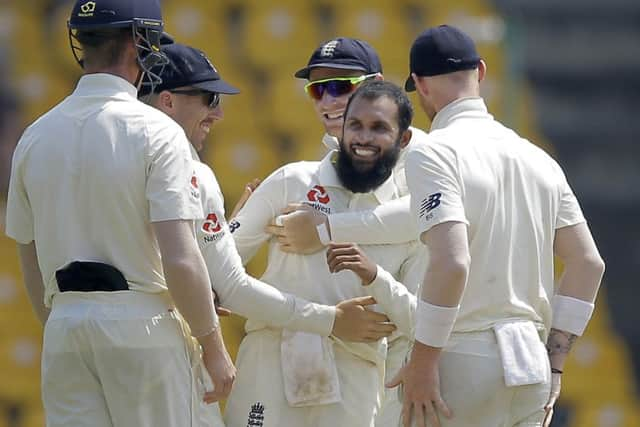Chris Waters '“ England's Pallekelle hopes left hanging in balance


As ministers resigned left, right and centre in the wake of Brexit, a political issue so complicated that it makes cricket seem as simple as a game of hide-and-seek, Sri Lanka’s batsmen proved somewhat harder to shift, unexpectedly so considering the amount of lavish spin on offer to the bowlers.
But as Moeen Ali, Jack Leach and Adil Rashid struggled for consistency, and as Sri Lanka fought hard in the sweltering heat, there were more cabinet resignations than Sri Lankan wickets as the hosts established a first-innings lead.
Advertisement
Hide AdAdvertisement
Hide AdThat had seemed about as likely as a smooth withdrawal from the EU when they were 165-6 in reply to England’s first innings 290 (more of which later), only for Sri Lanka’s lower-order to rally even more impressively than that of England’s as they got up to 336 before the tourists closed on 0-0 from a single over.
Although Sri Lanka still have to bat last, England missed a chance to take a giant step towards nailing down the series, having gone into the game 1-0 up in the three-match rubber.
Had they dismissed their opponents for, say, 200 or less, it is they who would be driving a contest that instead remains – much like Brexit – balanced on a knife-edge.
However, if England can post a score in the region of 250-300, a chase of around 200-250 would not be easy.
Advertisement
Hide AdAdvertisement
Hide AdAt the same time, trying to predict the outcome of a low-scoring match such as this is like trying to predict how Brexit will finish, a political game so ponderous that it should rightly excite no one with a pulse. Had it not been for two remarkable pieces of fielding from all-rounder Ben Stokes, a man who possesses freakish athleticism, England’s predicament would be rather worse – albeit not quite redolent of that of Theresa May.


First, Stokes swooped at backward-point to run out opener Dimuth Karunaratne (63) with a direct hit, and then he claimed a superb left-handed slip catch to remove Kusal Mendis off Leach, Sri Lanka slipping from 127-2 to 136-4 just before lunch.
When Rashid produced two jaffas after the break to have Dhananjaya de Silva (59) and Angelo Mathews caught behind, having hitherto served up too many liquorice all-sorts, the balance had shifted back towards England.
But the last four wickets added 171, Roshen Silva leading the way with the highest score of 85 from 174 balls, ably backed up by a tail that wagged with Dominic Raab and Esther McVey-esque defiance.
Advertisement
Hide AdAdvertisement
Hide AdNot even the concession of five penalty runs overly discombobulated Sri Lanka, although it could yet come back to haunt them in any 2005 Ashes-style finish.
The curious incident happened like this…Roshen cut a delivery from Leach towards the boundary and, assuming that it was going for four, made no attempt to touch down his bat at the non-striker’s end as he trotted down to complete what he decided was actually an unnecessary first run.
But Moeen, displaying some lithe athleticism of his own, reined the ball in and swiftly returned it as Roshen instead trotted back to the striker’s end.
As no run had actually been completed, and as Roshen’s act in not grounding his bat was deemed deliberate, the umpires awarded five penalty runs under Law 18.5, which were added on to England’s previous first innings score of 285.
Confused?
Advertisement
Hide AdAdvertisement
Hide AdThe rule is obscure to say the least, but the incident at least provided some light-hearted drama and confirmed the verity that, in cricket as in life, you learn something new every day.
As social media buzzed in light of the incident, with many considering – quite rightly to these eyes – that the punishment of no runs scored by Sri Lanka should have been sufficient, one wag beautifully seized the moment.
“England confirm penalty runs will bat number three in the second innings,” he tweeted in reference to England’s perennial problem position, one that was set to be filled by Keaton Jennings on day three after nightwatchman Jack Leach negotiated the final over of day two.
And so, after a day in which four England spinners took a wicket in a Test innings for the first time since 1962, when Tony Lock, David Allen, Peter Parfitt and Bob Barber struck against India in Madras, no one quite knew which way this match was going – let alone the wretched Brexit end-game.
“British people want us to get this done,” was May’s staunch battle-cry to MPs, words to which England captain Joe Root could doubtless relate.